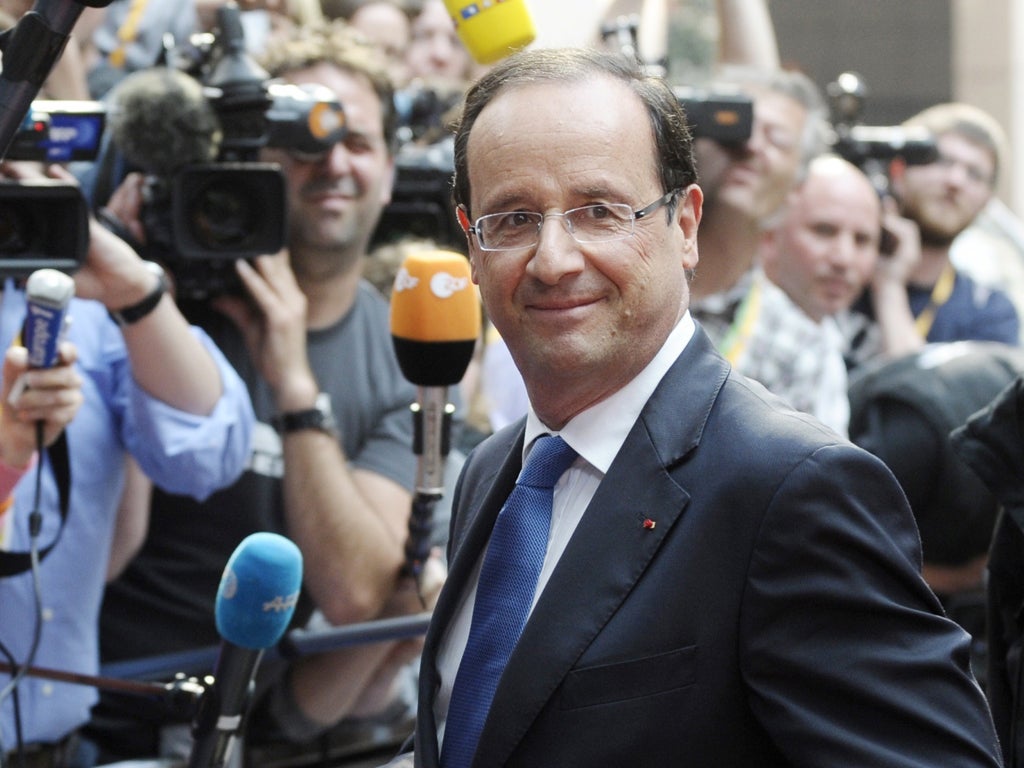Adrian Hamilton: Next stop for Europe should be Hollande paying a visit to Athens
World View: If Greece is essentially a political problem, it is one in urgent need of European direction

Europe is preparing for Greece to leave the eurozone but it doesn't want it to do it. That is the central dichotomy of the summit which ended in Brussels in the early hours of yesterday, as indeed of the last half-dozen summits before it. And it would have been mad to have expected the meeting to resolve matters.
All the pressure put on Germany to change its disciplinary stance has served only to have the opposite effect. Given her falling ratings and the constant haranguing by opposition politicians, the last thing Chancellor Merkel could do was suddenly announce a conversion to eurobonds and a different role for the European Central Bank. She can't do it under the constitution of the ECB and she can't do it politically. Full stop.
If Germany is to change, if Greece is to be kept in the euro, it is going to have to be through a Europe-wide political consensus which will enable Germany to adjust its position and Greece's partners to moderate theirs.
On that score, there's still room for hope, or, at any rate, manoeuvre. One thing that did come out of Europe was that, with François Hollande, we have a French leader who is clearly determined to push a growth agenda, even at the cost of open disagreement with Germany. More to the point, he seems willing to seek general support from the eurozone group as a whole to try to achieve it.
For two generations now, movement in Europe has been seen through the prism of Franco-German leadership. That has been particularly true with Nicolas Sarkozy and Merkel in this crisis. And there are plenty who would still say that, whatever his initial pronouncements, Hollande will fall into line, accepting some token measures of new investment for growth in return for accepting Berlin's insistence on austerity.
But the idea that a Franco-German duopoly could drive the eurozone to a clear agreement is a flawed one. Instead, what Hollande is proposing is a consensual shift which may suit a Germany concerned at faltering growth among its partners and anxious to avoid the role of dictator of the Continent.
You can see the outlines: a further direct bailout of the banks that might be unpopular, but would be more acceptable to German feeling than more extensive bailing out of states; a renewed commitment to fiscal discipline with tighter monitoring; a general growth strategy that would allow some flexibility on the timing of budget deficit reductions, although not the final targets.
It won't eliminate the worries over Spanish and Italian debt, but, for the markets, a sense of common political purpose in Europe is probably more important than impossible targeting. And, for the time being at least, Europe can cope with the financing needs of the Latin countries.
The fly in the ointment remains Greece. The most direct solution would be to just let it go, and there are many who would now urge this. But the sense from the summit was that Europe's leaders genuinely don't want this. Aside from the practical implications, there's the political fallout of a dismemberment of the eurozone group.
Not that the practical implications should be underestimated. The financial consequences of a Greece exit are probably exaggerated, but a failure to support the country would set the European "project" back on its heels.
If Greece is essentially a political problem, however, it is one in urgent need of European direction. Hollande has so far kept to the austerity script where Greece is concerned. But an early visit to Athens to give hope as well as sober advice could do wonders for the election campaign getting under way there and for the European cause.
Gunboats won't sort out Iran
What the British Foreign Office was doing in saying it was seeking legal authority to intervene militarily against Iran just as talks on its nuclear programme were getting under way in Baghdad is anybody's guess.
Well, it isn't, in the sense that it seems clear that the UK was trying to use the threat of force to concentrate the minds of the Iranian negotiators. But in the first place, it was tactically stupid to do so. Mutual suspicion between Iran and the West is too deep to allow a leap to agreement at this stage, but at least they had started with real signs that both sides wanted a solution. Threatening them with the Royal Navy wasn't going to help.
In the second place, Britain's intervention suggests that, despite Iraq, we are still in thrall to the oil sheikhs of the Gulf, and the worst elements of them. There they all were at the Queen's table this month, on Foreign Office advice.
Nothing could make them happier than seeing us send in the gunboats against their enemy, Shia Iran. But is it really in our long-term interests to back them?
Join our commenting forum
Join thought-provoking conversations, follow other Independent readers and see their replies
Comments
Bookmark popover
Removed from bookmarks